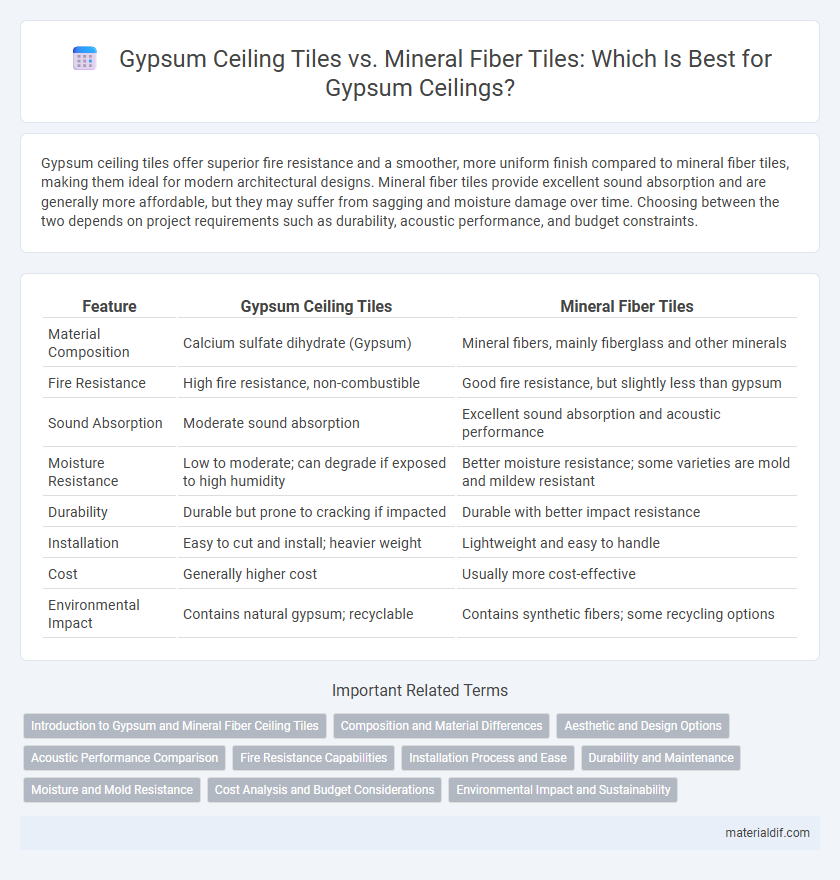Gypsum ceiling tiles offer superior fire resistance and a smoother, more uniform finish compared to mineral fiber tiles, making them ideal for modern architectural designs. Mineral fiber tiles provide excellent sound absorption and are generally more affordable, but they may suffer from sagging and moisture damage over time. Choosing between the two depends on project requirements such as durability, acoustic performance, and budget constraints.
Table of Comparison
| Feature | Gypsum Ceiling Tiles | Mineral Fiber Tiles |
|---|---|---|
| Material Composition | Calcium sulfate dihydrate (Gypsum) | Mineral fibers, mainly fiberglass and other minerals |
| Fire Resistance | High fire resistance, non-combustible | Good fire resistance, but slightly less than gypsum |
| Sound Absorption | Moderate sound absorption | Excellent sound absorption and acoustic performance |
| Moisture Resistance | Low to moderate; can degrade if exposed to high humidity | Better moisture resistance; some varieties are mold and mildew resistant |
| Durability | Durable but prone to cracking if impacted | Durable with better impact resistance |
| Installation | Easy to cut and install; heavier weight | Lightweight and easy to handle |
| Cost | Generally higher cost | Usually more cost-effective |
| Environmental Impact | Contains natural gypsum; recyclable | Contains synthetic fibers; some recycling options |
Introduction to Gypsum and Mineral Fiber Ceiling Tiles
Gypsum ceiling tiles are composed primarily of calcium sulfate dihydrate, offering superior fire resistance and moisture control compared to mineral fiber tiles, which are made from mineral wool or fiberglass with sound absorption properties. Mineral fiber tiles provide enhanced acoustic performance and lighter weight, making them suitable for noise-sensitive environments. Both materials serve as effective ceiling solutions, with gypsum excelling in durability and mineral fiber favored for acoustic insulation.
Composition and Material Differences
Gypsum ceiling tiles are primarily made from calcium sulfate dihydrate, offering a dense, fire-resistant, and mold-resistant structure derived from natural minerals. Mineral fiber tiles consist of a mix of mineral wool, clay, and other inorganic materials, designed for enhanced sound absorption and lightweight properties. The distinct composition influences durability, acoustic performance, and environmental impact, with gypsum tiles typically providing superior fire resistance while mineral fiber excels in noise reduction.
Aesthetic and Design Options
Gypsum ceiling tiles offer a smooth, uniform surface that can be easily molded into intricate designs, providing superior aesthetic versatility compared to mineral fiber tiles. Mineral fiber tiles generally feature a more limited range of textures and patterns, resulting in a more utilitarian look. The ability of gypsum tiles to be painted or finished with various coatings further enhances their design flexibility for modern and decorative interiors.
Acoustic Performance Comparison
Gypsum ceiling tiles provide superior sound absorption with a higher Noise Reduction Coefficient (NRC) typically around 0.70 to 0.85, making them effective in reducing echo and improving indoor acoustics. Mineral fiber tiles usually have an NRC range of 0.50 to 0.75 but offer better sound insulation due to their density, which helps block sound transmission between rooms. Selecting gypsum tiles enhances speech clarity and reduces reverberation in spaces requiring high acoustic performance, while mineral fiber tiles are preferable for environments prioritizing sound blocking and cost-effectiveness.
Fire Resistance Capabilities
Gypsum ceiling tiles exhibit superior fire resistance due to their dense composition of calcium sulfate dihydrate, which releases water vapor when exposed to heat, effectively slowing flame spread. Mineral fiber tiles, composed mainly of slag or recycled fibers, offer moderate fire resistance but can degrade faster under intense heat. Building codes and fire safety standards often favor gypsum ceiling tiles for applications requiring enhanced fireproofing and durability in commercial and residential spaces.
Installation Process and Ease
Gypsum ceiling tiles offer a straightforward installation process due to their lightweight nature and compatibility with standard grid systems, reducing labor time and effort. Mineral fiber tiles often require careful handling to avoid damage and may involve additional steps like protective coatings, making installation more time-consuming. Gypsum tiles' ease of cutting and fitting enhances overall efficiency compared to the more delicate mineral fiber options.
Durability and Maintenance
Gypsum ceiling tiles offer superior durability with resistance to cracks and warping compared to mineral fiber tiles, which are more prone to damage from moisture and impact. Maintenance of gypsum tiles is minimal due to their smooth, non-porous surface that resists dust and stains, whereas mineral fiber tiles require frequent cleaning and replacement in high-humidity environments. The longevity of gypsum tiles reduces overall lifecycle costs and makes them ideal for commercial and residential applications demanding long-term performance.
Moisture and Mold Resistance
Gypsum ceiling tiles exhibit superior moisture resistance compared to mineral fiber tiles, reducing the risk of water absorption and subsequent damage. Their dense, non-porous composition inhibits mold growth, enhancing indoor air quality and durability in humid environments. Mineral fiber tiles, being more porous, are prone to moisture retention and mold development, making them less ideal for areas with high humidity.
Cost Analysis and Budget Considerations
Gypsum ceiling tiles typically offer a lower initial cost compared to mineral fiber tiles, making them a budget-friendly option for large-scale projects. Mineral fiber tiles, while often more expensive upfront, provide enhanced sound absorption and durability, potentially reducing long-term maintenance expenses. Careful evaluation of project budget constraints and lifecycle costs is essential when selecting between gypsum and mineral fiber ceiling tiles.
Environmental Impact and Sustainability
Gypsum ceiling tiles offer superior environmental benefits due to their natural mineral composition, recyclability, and low embodied energy compared to mineral fiber tiles, which often contain synthetic fibers and chemical binders with potential VOC emissions. Gypsum is non-toxic, widely available, and can be recycled into new products, reducing landfill waste and promoting circular economy principles. In contrast, mineral fiber tiles may pose disposal challenges and contribute to indoor air quality concerns, making gypsum tiles a more sustainable choice for eco-conscious building projects.
Gypsum ceiling tiles vs Mineral fiber tiles Infographic

 materialdif.com
materialdif.com